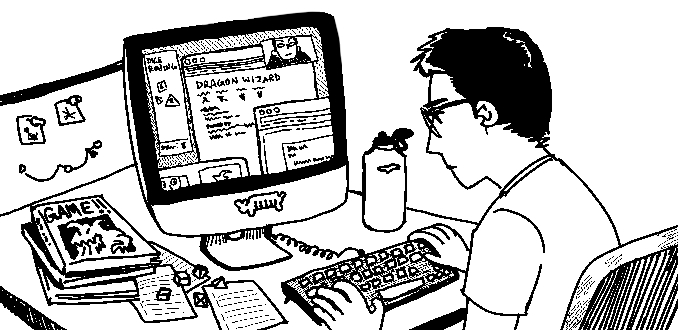
Shea Stevenson
You’ve heard of tabletop role playing games (TTRPGs) by now, namely the first and biggest one, Dungeons & Dragons (D&D). If you haven’t played them, you might be wondering what they are. If you have played them, you probably don’t know how to describe it succinctly. But before I get to the meat of this article on American folkloric tradition, allow me to catch everyone up on what I’m actually talking about.
For the next sentence, imagine the word ‘usually’ before every descriptor:
TTRPGs are imagination games where one or more people make and play a specific character in the game world. That world is narrated by, and all outside-character forces are played by, one or more other people who ‘run’ the game.
This looks like one person with notes and rule books narrating a scene’s elements, then asking a group of characters how they’ll respond. They roll some dice to see if they’re able to do the things they described, and the situation thus progresses. But such a clinical definition is like describing movies as “moving photos juxtaposed with other such photos played sequentially.” Any amount of objective description pales in comparison to experiencing the medium as it happens.
TTRPGs will only become more influential as they flower in popularity and understanding. Many TTRPGs still start with a ‘what is a TTRPG’ section. Can you imagine if video games started not only with a tutorial, but a ‘what is a video game’ pamphlet? The medium is in its infancy, and its exponential capitalistic proliferation is chiefly hampered by one characteristic: you have to be there!
That’s the innovation of actual-play streams like Critical Role, recorded D&D games with some production value. It opens that watch-and-learn experience to anyone with a computer. But as with all change, there are secret histories that it unearths and erodes, if accidentally.
In order to explain that, one last diatribe on D&D.
D&D’s creators carved it from the marble of the math-heavy simulationist war games that they loved to play. Just like that, a new medium sprung from the heads of some guys in Wisconsin, so it comes with heavy baggage attached to its frame. Imagine if “The Fast And The Furious” was the first movie ever made, and after it came out, people thought that ‘being about cars’ was as important as editing and lighting for something to be a movie.
Except with TTRPGs, a quirk of their nature means that enterprising players can decide not to carry its baggage, and often pick up their own along the way. Due to TTRPGs requiring a player as an interpreter of the rules, and given the complexity of games like D&D, TTRPGs become predisposed to a folkloric tradition, and have their secret histories.
If you run a game, you (probably) learned the rules by playing in a game run by someone else. The rules you learn then are not objective, but another’s interpretation of the text. And when you run, you do the same for your players, and them for their players. That was the cultural importance of hobby shops; they were the centers for these oral traditions where people learned, played, and passed the game along. Californians and New Yorkers might be, in effect, playing different games. That’s folkloric tradition.
But because of the internet, anyone can learn from anywhere (yay!), and they’re all learning from the same place (boo!).
At 12, I started playing TTRPGs at my local hobby shop. If I could’ve learned or played online, I would have done that instead. Why on earth would I choose to go out in public to do this? But I went, and played in a game run by an old-school D&D guy with some (in hindsight) profoundly eccentric ideas about the game. I played in that game for six years, a ridiculous span for a D&D campaign.
Now that I create and run original games – even though I don’t play D&D – many of his specific ideas about how TTRPGs should be seep into the way that I do things, because consciously or not, I am an inheritor of that specific shop’s traditions.
In a way, the medium tends towards monopoly. If you and a friend both speak two languages and share one in common, but the common language sucks, it’s far easier to just speak it than it is to learn a new language. That’s how it is with D&D. It’s not the best TTRPG, but everyone knows it. Of course you wouldn’t want to learn another if you think that all TTRPGs are as obtuse as D&D. But they’re not!
The indie scene around TTRPGs is having its largest movement since the 90s, when D&D was at its least popular and basement printing was taking off (another tradition dating back to early D&D). Today, ease of online publishing and greater awareness of the medium has led to a booming indie scene on platforms like itch.io. Whereas the 90s indie boom was characterized by pure iconoclastic style before ‘good’ game mechanics, the modern boom is characterized by an elevated understanding of the mechanical possibilities of TTRPGs and self-evident literary merit. Not only to be a good game, but to be a good read.
If you don’t play these games, you should. Find one with a flavor you like and play it with your friends – it doesn’t matter if you don’t know what you’re doing, that’s the power of these games. Playing them blindly in good company is great fun regardless.
If you do play these games and you haven’t heard of the modern indie boom, I implore you to check out artists like Everest Pipkin, Steven Dewey, Jenna K. Moran, and Jeeyon Shim. Get indie titles from people you’ve never heard of, play them, visit a hobby shop! It won’t kill you!
